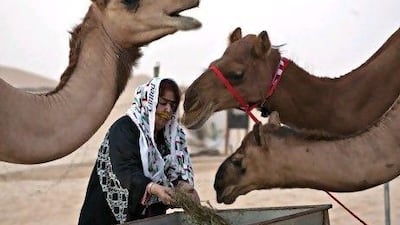ABU DHABI // Fatima Al Hameli started her professional career as a camel breeder when she pitched her tent beside the great sandy track at the Al Dhafra Festival.
She had arrived to stake her claim in the Arabian Peninsula's biggest camel beauty pageant.
Fatima marched up to the organisers and asked to enter her dusky camel Sudan into the competition.
"They said, 'No, you're a woman. It's forbidden'," says Fatima, who is now in her 50s. "I said, 'Women are the same as men, what's the problem?'"
In a country where women enrol in the army and run for election, the camel track is one of the last areas in which they are unseen.
Fatima was granted entry that day. It was her first foray as a professional camel competitor - and the first for an Emirati woman.
"She's a strong woman," says Fatima's daughter Afra, 28, who studied translation at university. "She likes to be the first in everything."
Camel racing and beauty contests are about prestige, money and fame.
"It's like a social power, to have so many camels," Afra says. "It's a man's domain."
Successful camels and their owners become household names. Events are heavily filmed, photographed, televised and broadcast live on radio.
The formal rules of racing and beauty contests are new and there is no rule that forbids women from competing. But social conventions make it a challenge.
"In all the Gulf, in Qatar, in Dubai, in all the Emirates there were no women, none," says Fatima. "It is forbidden."
A Qatari sheikha once participated in a race but on the rare occasion that women's camels are entered, it is under the names of male relatives.
"I have asked the women I know if they will come with me, but they said they can't because of their husbands and they are shy of the camera," Fatima says.
"I keep encouraging my friends and the women I know that they own camels but they say they can't."
Women like Fatima are raised around camels from childhood.
Born in the desert oasis of Liwa in the Empty Quarter, she started to tend camels with her father when she was 10.
At 12, she crossed from Abu Dhabi to Liwa astride her own camel, Saffron, in a four-week trip with her father, brother and cousin.
After marrying at 15, she would cross the Empty Quarter annually with her husband to hunt and graze camels at Umm Al Dhalooa ("the mother of the ribs") and Uruq Al Shaiba ("the old man's veins") in Saudi Arabia.
They navigated by the stars and would herd their camels by honking the car horns as they drove alongside.
At their home in Abu Dhabi city, Fatima kept camels in her back yard "in secret". Now she keeps 100 camels in Liwa and four on a small farm, or ezba, "close to home" in the centre of the desert between Al Ain and Abu Dhabi.
There, she hosts a women's majlis every night among the white dunes.
Her friends from Abu Dhabi, Al Wathbah and Baniyas arrive in 4x4s, wearing beautiful dresses. They unroll carpets and lay out cushions and lavish feasts for all of the guests.
Every meal is served with fresh camel milk from Mabrooka, a five-year-old mother.
"I love it; I love it from my heart," says Fatima. "The day I can't see my camel I can't live, I feel empty."
Yet until she made her demands at Al Dhafra three years ago, she was not recognised as a professional owner.
Sudan did not take home any prizes at that first festival but the experience encouraged Fatima to enter a camel auction last year. Those she bought - Tayara ("Airplane"), a female, and Captain, a male - placed at their first race in August and Fatima had offers of Dh2 million.
Supported by the sheikhs, she now receives a personal invitation to auctions. The Emirati celebrity camel race commentator and auctioneer Saif Al Kitbi calls her a "dear sister".
"I expect more women to enter this area after Ms Fatima's participation," Mr Al Kitbi says.
Fatima's recent camel purchase at the Abu Dhabi International Hunting and Equestrian Exhibition will be trained for races in August next year.
"I did it once and I will do it again," she says. "I have a licence for racing."
She has already decided to go to Qatar for an auction in January and one in Al Wathbah this spring. "In March, I hope that some women will participate with me," she said. "I encourage any woman to enter with me."

